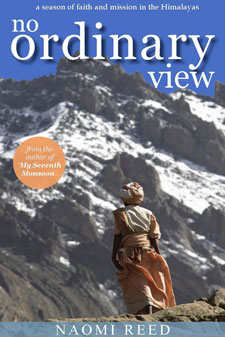Naomi Reed's No Ordinary View is the sequel to 2008's Australian Christian Book of the Year runner up My Seventh Monsoon.
Set in Nepal in the context of ten years of civil war, a deteriorating health system, an economic crisis and a political stalemate, Reed's account tells of the apparent hopelessness for the lives of her Nepali friends and the community in which she lived.
 "In such a setting of pain and darkness, how could God reveal his nature?' Naomi asks.
"In such a setting of pain and darkness, how could God reveal his nature?' Naomi asks.
Naomi and her husband Darren were both physiotherapists and felt strongly called by God to serve in Nepal in that capacity.
The first book, My Seventh Monsoon, tells of their first stay in Nepal where two of her sons were born. They came back to Australia when her husband Darren was found to have a heart condition. Naomi also gave birth to small babies. After some years with their health now stabilised and a third son on the scene, the family returned to Nepal.
This book primarily focuses on Naomi's personal journey in the country, her work, and her close walk with God. She has a delightful writing style and I really felt as though I was journeying with her on her travels.
Reed's writing gives us a picture of the landscape, the house and the furniture etc, in a way that is never boring. You can almost picture exactly what she is looking at as she describes it.
One telling example is her account of a very wet time during a monsoon:
"I watched from the back porch as the rain poured down in streams from the roof of our house. It splashed into the mud beneath the swings and made a thudding noise on the roof of the chicken coop. It splattered off the banana leaves and landed in showers on the beans below them."
Among Naomi's tasks was teaching a class of students about amputee rehabilitation. She asked the students what were the five common causes of amputation. The answers given were: bombs, gunfire, grenades, landslides and leprosy.
What a contrast to the western textbook causes: peripheral vascular disease, infection, cancer, trauma, and congenital deformities.
In living out truth, Reed writes: "We can pack truth into our minds and memorise scripture. But it is the "living' of it that we struggle with, especially when no one is watching."
Reed reveals that "Shanti' is the Nepali word for peace. The Nepali Christians have found that there can be "shanti' in the heart even though there is trouble in life. Failing exams, missing relatives, lack of food and wars may still be part of the daily experience, but there is "shanti' in the heart.
The Nepali Christians come together to praise and worship. And they sing lustily. They own no house nor vehicle, they have very few clothes, but they can still sing "Rejoice in the Lord".
There were times when life was hard. But then Reed imagined God asking her, "Where would you rather be?" and she would say, "Here, Lord".
Reed wisely reflects on Philippians 4:11, "Paul did know the secret to contentment. He knew how to keep his eyes on heaven and he knew that he found contentment in one place only " in Him, the Lord God. Who gives him, and us, the strength that we need for the situation we find ourselves in".
At the end of No Ordinary View a chapter from My Seventh Monsoon is included. In it Naomi describes how God led her and her husband to Nepal as physiotherapists. The following passage always makes me smile:
She rang the International Nepal Fellowship. The lady who answered the phone said: "That's funny. I sent out an urgent advertisement for two physiotherapists just yesterday."
"It's us!" Naomi cried.
"We have never again, before, or since, known that level of conviction."























